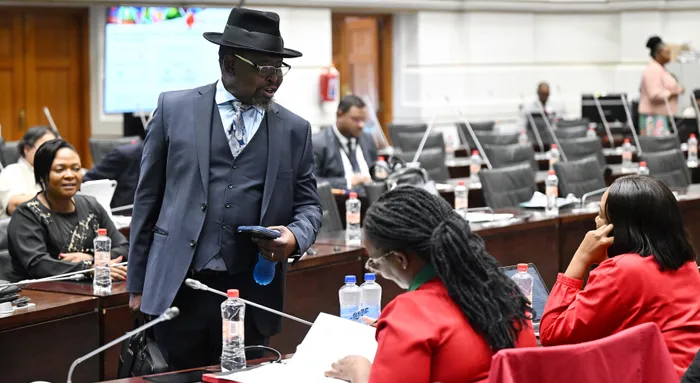Business sector warns of ongoing fiscal challenges after VAT hike reversal
BUDGET

Finance minister Enoch Godongwana was forced to postpone his initial Budget Speech in February after Members of Parliament took issue with the proposed 2% Value Added Tax (VAT) increase.
Image: Phando Jikelo/ Parliament of SA
South Africa's business sector has cautiously welcomed the scrapping of the proposed 0.5 percentage points increase in the value-added tax (VAT) as a crucial relief for consumers, the country's fiscal position remained severely strained.
However, the business industry said that the government would have to find alternative measures to raise enough revenue to plug the national budget deficit amidst rising debt-servicing costs and other national expenditure priorities.
This comes as the National Treasury on Thursday announced that Finance Minister Enoch Godongwana will no longer be increasing the VAT from 15 to 15.5% from 1 May, which was proposed in the National Budget to plug the R58 billion fiscal deficit.
North West University Business School economist, Prof Raymond Parsons, said a rise in VAT brought welcome relief and certainty to business and consumers, and to that extent is confidence-building.
However, Parsons said this did not mean that fiscally South Africa was out of the woods.
“Future risks to fiscal policy remain. Successfully managing these now depends on a credible fiscal strategy ‘to balance the books’ being embodied in the third budget to be presented shortly by the Treasury to Parliament,” Parsons said.
Treasury said the decision to forgo the increase followed extensive consultations with political parties, and careful consideration of the recommendations of the parliamentary committees.
“By not increasing VAT, estimated revenue will fall short by around R75bn over the medium-term,” Treasury said.
“The decision not to increase VAT means that the measures to cushion lower income households against the potential negative impact of the rate increase now need to be withdrawn and other expenditure decisions revisited. To offset the unavoidable expenditure adjustments, any additional revenue collected by SARS may be considered for this purpose going forward."
Boipelo Ndimande, chief financial officer at Consult by Momentum, said that the decision to reverse the proposed VAT increase brought welcome short-term relief.
"However, this postpones rather than resolves the estimated R75bn revenue gap," Ndimande said.
"As the government looks to revise spending or explore alternative ways to boost revenue, it’s clear that difficult decisions still lie ahead—and South Africans may yet feel the impact elsewhere."
As it stands, government debt is projected to stabilize at 75.5% of GDP in 2025/26, a necessary step to address burgeoning debt-service costs, which are expected to peak at 21.7% of revenue.
This year, debt-service costs have already surged to R233.1bn, reflecting a 5.8% increase from the previous year.
The South African Chamber of Commerce and Industry (Sacci) said whilst this was a positive move, it was by no means a resolution of the bigger problem with the country's finances.
Sacci president, Alan Mukoki, said the fiscal situation was not sustainable but appreciated the difficulty Godongwana was facing in balancing his revenue and expenditure options.
"We still have a serious problem with how to deal with the budget and, in particular, the deteriorating debt servicing costs to revenue," Mukoki said.
"We do not underestimate the complexity of the problem. This is no longer about the political parties or Government of National Unity (GNU). This is South Africa’s problem that will require all key stakeholders to spend more time looking for solutions."
The National Automobile Dealers’ Association (NADA) said although the country continued to face many headwinds, these signs pointed to improving economic stability and greater certainty.
NADA chairperson Brandon Cohen said the decision on VAT provided a solid foundation to shift focus towards driving inclusive economic growth, creating opportunities, and rebuilding confidence in the economy.
"NADA believes that policy consistency and a stable economic environment are essential to restoring confidence across the value chain – from manufacturers and dealers to business and consumers," Cohen said.
Linked to the reversal of the VAT increase is the withdrawal of the Godongwana’s decision to expand the basket of VAT zero-rated food items to ease the burden of food costs on the poor and the vulnerable.
In his budget statement last month, Godongwana proposed expanding the basket of VAT zero-rated food items to include canned beans and peas, dairy liquid blends and certain organ meats (offal) from sheep, pigs, goats and poultry.
Zinhle Tyikwe, CEO for the Consumer Goods Council of South Africa (CGCSA), said this was very concerning.
"Our members have and continue to find ways of ensuring that basic food items are sold at competitive prices, aware of the impact of food costs on their consumers, particularly the poor and disadvantaged," Tyikwe said.
"Expanding the basket of VAT zero-rated food items would have been beneficial to consumers."
BUSINESS REPORT